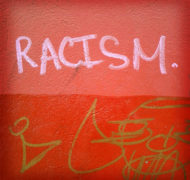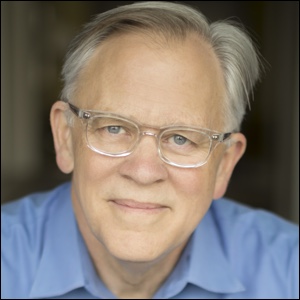What Ferguson Taught Us: Letter to Ferguson
Blog / Produced by The High Calling
Dear Fuller Community,
I am compelled to write about events that have unfolded these last three weeks in Ferguson. We all must await the facts and conclusions of this particular case, but meanwhile, silence is one of the sins of omission that has allowed us to be in denial about racism in our country, far more widespread than just one small Missouri town. I may be writing from my office across the country from there, but Ferguson is Pasadena as much as it is any other place where the Fuller community lives in the context of unreconciled racial tension.
Ferguson, Missouri exposes the open wound of racism in America. It’s not new, and it’s not healing. Daily, throughout this country, the nerve-endings of racial tension, pain, fear, and hatred are triggered. In the case of Michael Brown’s death, the drama becomes public and protracted. We are a long way from knowing how this changeable and conflicted story in Ferguson will unfold and what measure of justice will or will not be served. Our hearts are broken. We are angry and confused.
I have been cataloguing in my mind my African-American brothers who have been victims of police violence. Even one instance would be too many, and yet my personal knowledge is double digits. None have lost their lives to death, but each life has been permanently changed. Modest accountability for the police officers involved sometimes occurred. Silence and inaction were the most common outcomes. A sense of belief in the possibility of fairness, justice, equality or communion was sacrificed.
The wound exposed by Ferguson is not, however, exclusively or even primarily about police brutality, nor is it simply the shooting death of an unarmed African-American teenager. These are urgent and important offenses, but the far more pervasive wound that this story lays bare is of a minefield of racism, with shrapnel buried and unhealed from the past.
Every race has its victims and perpetrators: the impact is felt in countless instantaneous exchanges, glances of disregard, attitudes of disdain, verbal cuts of hatred. The shrapnel embeds itself deep inside a person, and when it isn’t removed, the resulting toxicity gradually infects a whole life. Multi-generational wounds fester that a tragedy such as that in Ferguson draws to the surface. The excruciating suffering that exists under the surface is not new, it is simply exposed again to a culture in denial.
These individual re-openings of the wounds of racism occur amid patterns, systems, and institutions that reify hatred and separation. Invisible but pervasive are the often cavalier ways that bureaucratic decisions ignore racial realities, leaving people permanently and hopelessly excluded from the societies of which they are so vital a part. Individuals working inside such systems may be advocates of racial equality, of course, and often their motivations may be to “make a difference.” But when the keepers of the public justice system appear to violate justice itself, anger erupts, despair intensifies, and buried shrapnel re-lacerates the old and the young alike.
What can we do? What should we do?
Listen. This moment calls God’s people to action, but action should start by listening. Choose to be with people who do not share your own ethnic background, and listen to the stories and the pain. Resist defensiveness or denial, rescue, or tidying it all up. Keep listening—especially to stories of those whose race or ethnicity is not your own. Love starts here.
Pray. Find someone in the body of Christ to pray with about what you are hearing. Bringing God’s passionate concern for love and justice into these matters is critically important and reminds us that the just, forgiving, loving power of God can make a difference. Call upon the God who seeks justice and calls us to as well.
Attend. Look for ways to engage the conversation further, to share in the hearing of stories different than your own. We will be hosting on our Pasadena campus, and possibly elsewhere, conversations about issues of race and the questions and challenges that face our lives as part of Christ’s body.
Read. Much has been written on subjects related to race that is worth reading. To start, I have found valuable Divided by Faith: Evangelical Religion and the Problem of Race in America by Christian Smith and Michael O. Emerson (OUP, 2000); The New Jim Crow: Mass Incarceration in the Age of Colorblindness by Michelle Alexander (The New Press, 2013); Race: A Theological Account by J. Kameron Carter (OUP, 2008).
Write. For those of you who have local, state, and national representatives, let them know your convictions about the meaning and urgency that events in Ferguson and beyond trigger for you and your friends. Don’t feel the need to pretend you are a legislator, just express the concerns most on your heart and the questions and issues you want them to engage, or the listening you believe they need to do.
Build relationships. Seek out people in your workplace and neighborhood and church who are likely to have a different cultural experience than yours and get to know them and their stories. Listen for deeply harbored wounds of racism untold, and be willing to let forgiveness and reconciliation do their miraculous work through you.
Act: Then join together with your new relationships in concrete local action to improve interracial relationships between churches, and with your neighborhood and in your places of work. Find ways you can contribute to changing systemic patterns—call out racism when you hear or see it. Accept opportunities—or make them—to actively educate about and address racism when you become aware of it. [The PICO National Network may be a helpful resource. Its “Lifelines to Healing” efforts in response to gun violence and mass incarceration are doing great work.] Read. March. Speak. Listen. Sign. Vote. Repent. Apologize. Forgive. Change. Love acts.
Yours in the one who has broken down the dividing walls of hostility, Jesus Christ,
Mark Labberton
______________________________
 Mark Labberton is President of Fuller Seminary in California. He has also been chair of John Stott Ministries (which provides books, scholarships, and seminars for Majority World pastors), co-chair of the John Stott Ministries Global Initiative Fund, and senior fellow of the International Justice Mission. His newest book is Called: The Crisis and Promise of Following Jesus Today.
Mark Labberton is President of Fuller Seminary in California. He has also been chair of John Stott Ministries (which provides books, scholarships, and seminars for Majority World pastors), co-chair of the John Stott Ministries Global Initiative Fund, and senior fellow of the International Justice Mission. His newest book is Called: The Crisis and Promise of Following Jesus Today.
What Ferguson Taught Us About Hope
Last weekend, The High Calling and several others visited Ferguson, Missouri, to listen. We heard stories from pastors, police, and members of the community. All week, we are sharing what we learned from this experience in a bonus theme, "What Ferguson Taught Us," chronicling everything from our time with Capt. Ronald Johnson of the Missouri Highway Patrol to our time with people on the street.
" … hope does not disappoint, because the love of God has been poured out within our hearts through the Holy Spirit who was given to us." Romans 5:5





